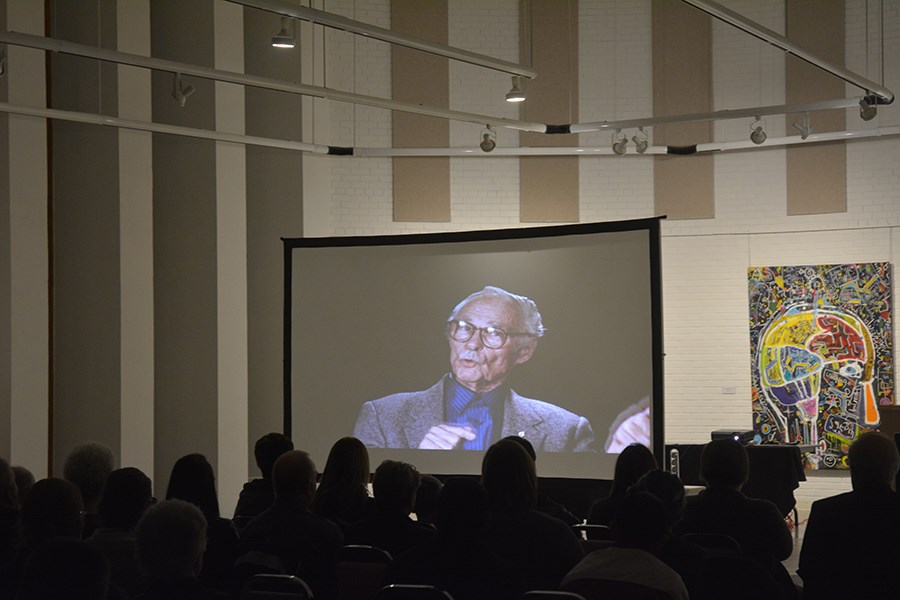Since the early 1930s, some governments and writers have denied the Holodomor, but the audience gathered at Chapel Gallery on Wednesday, Nov. 22, ensured the Holodomor wouldn’t be forgotten.
Chapel Gallery hosted a Holodomor commemoration event in partnership with the Ukrainian Canadian Congress - Saskatchewan Provincial Chapter and the Battlefords Ukrainian Cultural Council.
The event centred on screening the 30-minute documentary Holodomor: Voices of Survivors by Canadian filmmaker Ariadna Ochrymovych.
Living Sky School Division’s Jim Shevchuk M.C.’d the event, Paul Kardynal spoke, and along with Brianna Barclay read text of an interview between an interviewer and the filmmaker. Kathleen Abrahamson read first-person accounts from people who survived the Holodomor. Violin and cello music welcomed patrons, and the event featured artworks by JPII students inspired by the Holodomor. John Paul II teacher Rhea Good organized the event.
Released in 2015, the documentary splices first-person accounts by Ukrainian Canadians who lived through the Holodomor with information pertaining the early 1930s socio-political context, with focus on decisions by Soviet authorities that led to the Holodomor. The film was an official selection at a number of film festivals, and won the Golden Sheaf Award for Best Research at the Yorkton Film Festival in May 2016.
There have been thousands of pages of scholarship written about the Holodomor, some of which the film references. Soviet propaganda initially suppressed information about the famine, within its own sphere of influence and abroad. Journalism both disseminated and contradicted Soviet messages. Walter Duranty, who won a Pulitzer Prize in 1932 for his articles on the Soviet Union, denied starvation and death by starvation; contemporary correspondents and other writers have since discredited much of Duranty’s work. Conversely, the writing of British journalist Gareth Jones exposing the famine was featured in a number of influential Western newspapers during the 1930s.
British historian Robert Conquest dedicated much of his career to researching the USSR, and his 1986 study Harvest of Sorrow: Soviet Collectivization and the Terror Famine has been praised as an accomplishment of modern historiography.
The 2000s saw not only more work from scholars but recognition of the severity and scale of the Holodomor by popular audiences, such that the matter became politically relevant. In 2006, Ukraine’s parliament recognized Holodomor as genocide, followed by Canada’s parliament in 2008, and number of governments afterward.
The declassification of Soviet historical records and availability of archives have seen new areas of inquiry and a diversity of scholarly opinion. Two recurring questions include Stalin’s intentionality and the Holodomor’s status as genocide. Some organizations have disputed the designation of genocide for explicitly political reasons, such as communist parties.
As opposed to the relatively straightforward task of establishing the existence of a major famine in present-day Ukraine in the early 1930s, an entry in the Encyclopedia of Genocide and Crimes Against Humanity states “it is more complex to resolve the question of the genocidal nature of the catastrophe.”
The entry outlines four scholarly approaches:
“Some scholars flatly rejected the notion that the famine was genocide, others avoided the problem of classification by using descriptive terms such as ‘great famine,’ ‘artificial famine,’ or ‘man-made famine.’ Still others accepted the idea of genocide, but saw its victims primarily as the kulaks, or peasants; and, finally, some scholars recognized the famine as a genocide that was specifically directed against the Ukrainian nation.”
The article’s position regarding intentionality is “Stalin was not only well informed about the famine, he was its chief architect and overseer.”
One not-too-faraway historian informed of the debates is the University of Alberta’s David Marples, who “promote[s] the recognition of the Holodomor as genocide.”
In a 2005 newspaper article explaining two contrasting opinions at the time, Marples wrote about scholars he deems “environmentalists” who, with conclusions based on extensive archival research, emphasize environmental factors in the exacerbation of the famine over Stalinist mandates. Marples, while appearing to disagree with the conclusions of such scholars, advocated for extensive research based on the archives and villages of Ukraine, and that some of Conquest’s work is inadequate. Marples also supported translating the work of Ukrainian scholars into English.
It’s also noteworthy that Canadian prairie universities and their presses publish leading English-language research on the Holomodor. A recent book published by the University of Regina is Starving Ukraine: The Holodomor and Canada’s Response by Serge Cipko.
Regardless of the technicalities of the debate, commemorating human suffering appeared to be the film’s and the event’s primary purpose.
“I want the word Holodomor to have as much public awareness as the word Holocaust, and just to bring to light this dark piece of history that has been so diligently covered up,” Good said.




